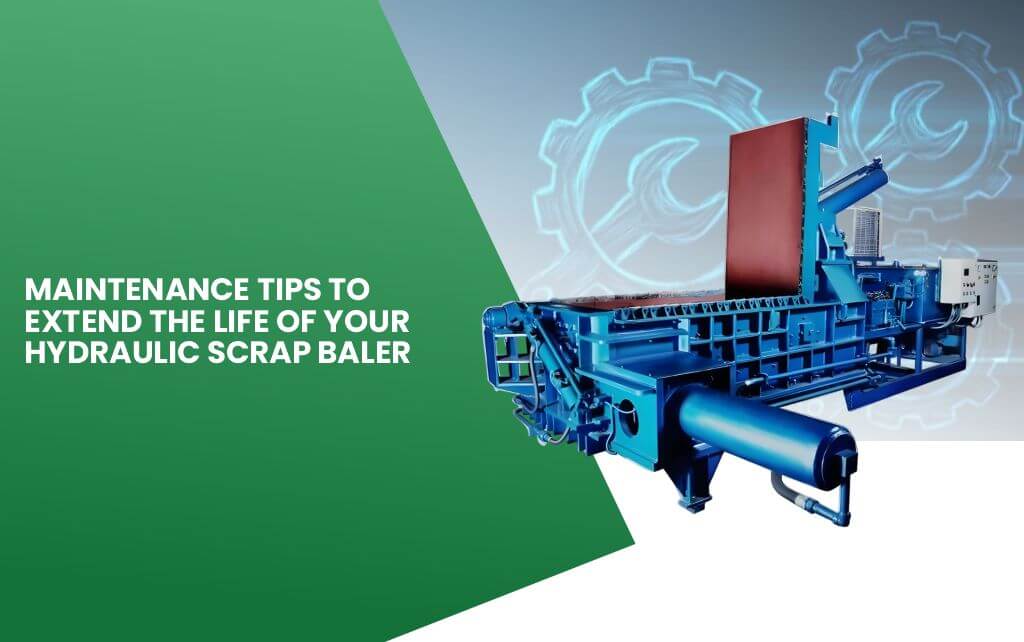Maintenance Tips to Extend the Life of Your Hydraulic Scrap Baler
- Written by: Admin
- September 12, 2025
- Categories: Scrap Processing Machines
- Tags: , Hydraulic Scrap Balers
Introduction: Why Hydraulic Scrap Baler Maintenance Matters
When you invest in a hydraulic scrap baler, you’re not just buying a machine—you’re securing the backbone of your recycling operation. A baler that runs smoothly can handle tons of scrap every day, reduce downtime, and improve efficiency. But like any heavy-duty industrial equipment, neglecting maintenance can lead to costly breakdowns, reduced performance, and even safety risks.
Over the years, businesses get far more out of their balers simply by sticking to a regular maintenance routine. In this article, we are sharing practical, easy-to-implement maintenance tips to extend the life of your hydraulic scrap baler. By the end, you’ll have a clear checklist to keep your machine performing at its best for years to come.
1. Stick to a Regular Cleaning Routine
One of the most overlooked aspects of baler maintenance is cleaning. Scrap balers handle metal, plastic, cardboard, and other debris that can easily build up in the machine’s crevices.
- Daily wipe-downs: Remove dust, dirt, and scrap fragments at the end of each shift.
- Weekly deep cleaning: Check for compacted material in corners, between moving parts, and around the hydraulic system.
Personal insight: In a plant where a hydraulic scrap baler failed because small bits of wire had jammed the hydraulic chamber. The repair cost thousands—something that could have been prevented with a quick daily cleaning routine.
2. Keep an Eye on Hydraulic Fluid Levels
Hydraulic fluid is the lifeblood of your baler. If it’s dirty, low, or leaking, the entire system suffers.
- Check fluid levels weekly. Refill as needed with the manufacturer’s recommended oil.
- Inspect fluid quality. If the oil looks cloudy or smells burnt, it’s time for a change.
- Look for leaks. Leaking seals or hoses should be replaced immediately to prevent pressure loss.
Think of it like changing the oil in your car—skip it, and the engine wears out faster. The same principle applies to your hydraulic scrap baler.
3. Inspect and Tighten Bolts, Nuts, and Connections
With the constant vibration and pressure of baling operations, bolts and fittings can loosen over time.
- Monthly inspections: Check all nuts, bolts, and connections. Tighten where necessary.
- Pay attention to safety guards. A loose guard not only affects performance but also poses a safety hazard.
This step is quick and costs almost nothing, yet it significantly reduces the risk of unexpected breakdowns.
4. Monitor Wear and Tear on Moving Parts
Every hydraulic scrap baler has components that naturally wear down—blades, rams, and seals, for example.
- Check blades for sharpness. Dull blades increase stress on the hydraulic system.
- Inspect seals and gaskets. Replace them at the first sign of cracking or leakage.
- Keep bearings lubricated. Use high-quality grease to reduce friction and heat.
Example: One client extended the lifespan of their baler’s cutting blades by six months simply by scheduling regular sharpening instead of waiting for a breakdown.
5. Follow a Preventive Maintenance Schedule
Preventive maintenance is about fixing small issues before they become major problems.
- Daily: Clean surfaces, check fluid levels, and remove debris.
- Weekly: Inspect hoses, seals, and moving parts.
- Monthly: Tighten bolts, lubricate bearings, and test the hydraulic system pressure.
- Annually: Schedule a professional inspection to review electrical systems, cylinders, and overall performance.
Following this schedule not only extends the machine’s life but also ensures compliance with safety standards.
6. Train Your Operators Properly
Even the most durable hydraulic scrap baler won’t last long if operators don’t use it correctly.
- Provide hands-on training. Show staff how to load scrap, operate controls, and follow safety steps.
- Encourage reporting. Train operators to recognize unusual noises, vibrations, or leaks and report them immediately.
- Avoid overloading. Pushing the baler beyond its capacity is one of the fastest ways to shorten its lifespan.
Well-trained operators are your first line of defense against premature equipment failure.
7. Partner with a Reliable Service Provider
No matter how well you maintain your baler, professional servicing is essential.
- Schedule yearly maintenance. A qualified technician can detect issues you may overlook.
- Build a long-term relationship. A trusted service provider will know your equipment’s history and provide tailored advice.
- Invest in genuine spare parts. Using low-quality replacements often leads to more frequent breakdowns.
This partnership ensures your machine gets the care it needs while keeping downtime to a minimum.
Conclusion: Keep Your Hydraulic Scrap Baler Running Strong
A hydraulic scrap baler is a major investment, but with the right care, it can serve your recycling business for many years. From cleaning and fluid checks to preventive maintenance and operator training, every small step adds up to big savings in repair costs and downtime.
At Super Recycling Solutions, we’ve seen firsthand how businesses improve efficiency and reduce expenses by prioritizing maintenance. Start applying these tips today, and your baler will reward you with consistent performance and a longer service life.
Frequently Asked Questions
How often should I change the hydraulic fluid in my scrap baler?
Every 2,000 to 4,000 hours of operation, depending on usage and the manufacturer’s recommendation.
What happens if I don’t maintain my hydraulic scrap baler?
You risk unexpected breakdowns, higher repair costs, reduced efficiency, and a much shorter machine lifespan.
Can I use any type of hydraulic oil in my baler?
No. Always use the manufacturer-recommended hydraulic fluid to avoid damage to seals and pumps.
How can I tell if my baler’s hydraulic system has a problem?
Watch for signs like slow operation, unusual noises, leaks, or inconsistent pressure.
Should I handle all maintenance in-house or hire professionals?
Routine cleaning and checks can be done in-house, but annual servicing by a professional is strongly recommended.


